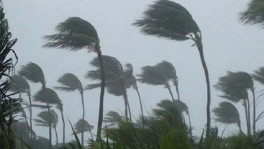Children call for action to address climate change: Unicef
Three hundred “child parliamentarians,” representing all the constituencies of Bangladesh, debated climate issues, policies and actions to safeguard their futures

Bangladeshi children have sounded the alarm on climate change and called for urgent action to address its disastrous effects at a historic Children's Climate Summit held on Friday.
The Summit culminated in the adoption of a Children's Climate Declaration, which was presented to national leaders in the spirit of intergenerational solidarity.
In the declaration, the children called upon decision-makers to reduce pollution and greenhouse gas emissions; to invest in education, training and a green economy; and to protect children from the impacts of climate change, read a press release the United Nations Children's Fund (Unicef) issued on Friday.
Over one million children were engaged in the Children's Climate Summit, which was a part of Unicef's Generation Parliament, hosted on a virtual platform that connected children to policies and decisions that impact their future.
The Summit brought together 300 "child parliamentarians," representing all the constituencies of Bangladesh, to debate climate issues, policies and actions to safeguard their future.
"Our country is on the frontlines of climate change. Sea level rise, erosion, pollution, and extreme weather jeopardise our survival, wellbeing and future. Children must be consulted on policies and decisions that impact their future. There is no time to lose," said Ridwana Islam, 15, a child parliamentarian from Dhaka.
"The climate emergency requires bold leadership as we battle against the clock. We must look to children and young people for inspiration, courage and vision. Unicef works to help Bangladeshi children be a part of a societal decision-making process on climate change-related issues as they directly impact their future," said Tomoo Hozumi, Unicef Representative in Bangladesh.
The Summit was chaired by Shamsul Hoque Tuku, lawmaker and president of the Parliamentary Caucus on Child Rights, and was attended by child climate activists, parliamentarians and climate stakeholders from across the country as well as by the government, civil society and the development community.
"Today children have taught us that our youngest citizens should play a key role in shaping climate policy. It will be my pleasure if I can make a commitment to the Children's Climate Declaration in the near future at the Parliament," said the Deputy Speaker of the Parliament lawmaker Fazle Rabbi Miah.
The virtual Summit was the first gender-equal Child Parliament in Bangladesh with 50% representation of girls and 50% of boys aged 13 to 17 years. The conference connected young climate activists across geographical and social divides.
Together, the children delivered a clear message to leaders, the press release said, adding, "Our futures are intertwined and our planet is shared. We must act now to confront the crisis in the wake of climate change, and we, the children, must be a part of the solution."


 Keep updated, follow The Business Standard's Google news channel
Keep updated, follow The Business Standard's Google news channel
















